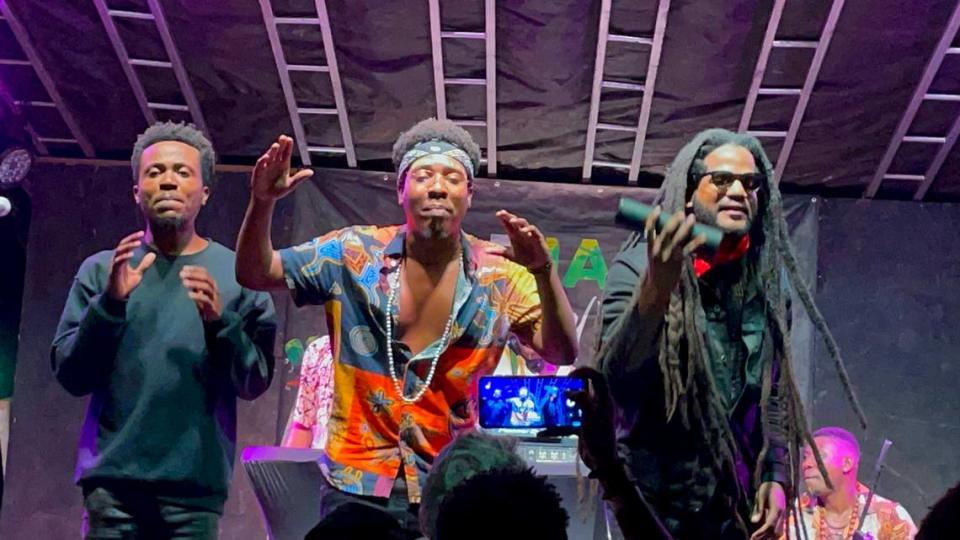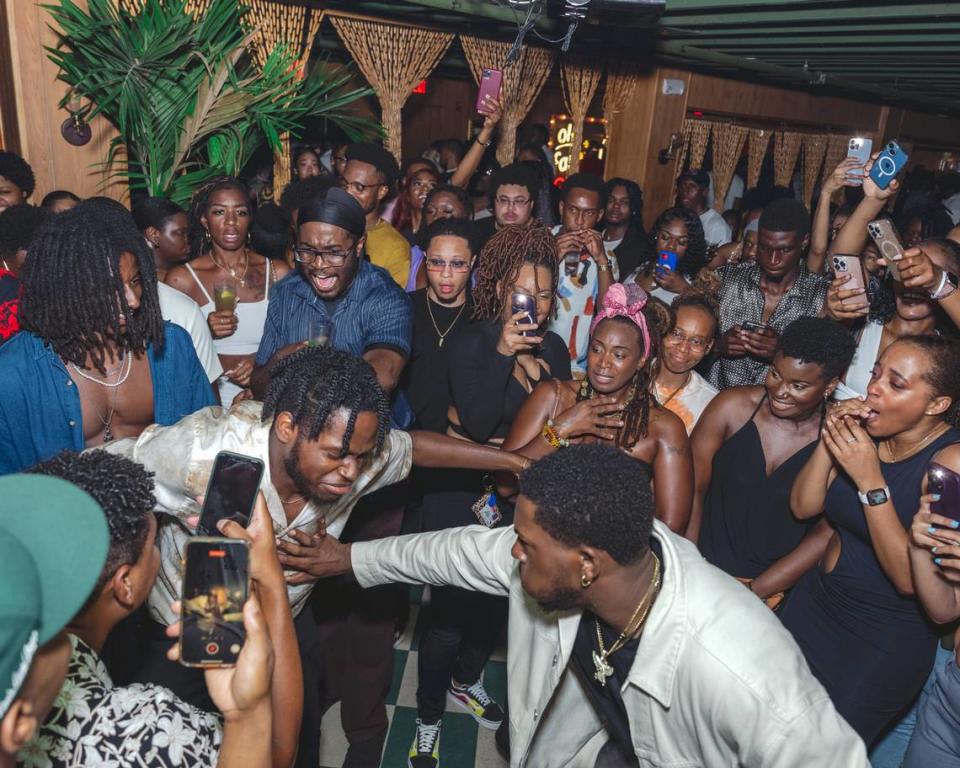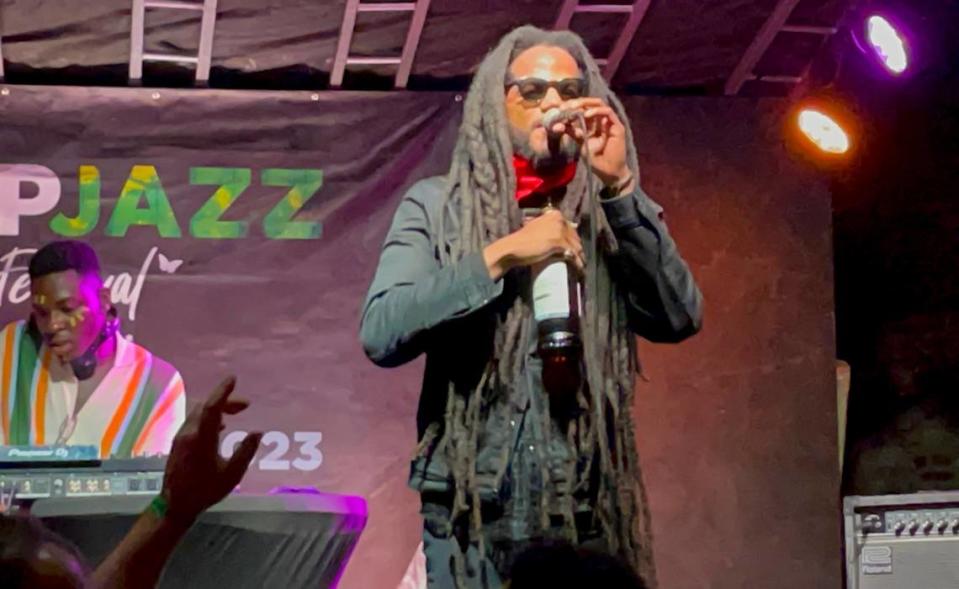The world’s listening to Afrobeats. Why is Haitian konpa still struggling to crossover?
Turn on your favorite urban contemporary Miami radio station and you will hear a rotation of hip-hop, dancehall, reggaeton and Afrobeats, the fast-rising music set to percussive African beats with a hint of hip-hop, and R&B.
What you’re unlikely to hear, however, is konpa — the Haitian dance music rooted in elements of jazz, soul and Dominican merengue accompanied by traditional brass and electrified guitars or digital instruments to produce a big band feel.
More than 50 years after a Haitian saxophonist and band leader by the name of Nemours Jean-Baptiste founded the new style of Haitian dance music that he called “Compas Direct,” the music is still struggling to find a wider audience beyond its country of origin.
For years, patrons and performers of konpa (con-pah), which is sometimes spelled Compas in French, argued that the problem was its Creole language barrier. But with the expanding popularity of Afrobeats, which is often sung in West African languages, many are beginning to rethink that argument.
“It’s a numbers game,” said Joey Budafuco, a leading promoter of Caribbean music in South Florida, explaining why he thinks Afrobeats has broken through like reggaeton but genres like konpa and Trinidad’s soca have not. “Just look at the number of people who are supporting it.”
In Nigeria alone, where the sound is popular, the population is over 200 million compared to Haiti where the population is about 12 million. Afrobeats has had such a swift rise that the first Afro Nation Festival in the continental United States is coming to Miami Memorial Day weekend.

Indeed Afrobeats’ meteoric rise has been underpinned by the growing numbers of Africans around the globe and in West Africa, where the music was born. But it is also an example of the use of social media like TikTok and collaboration across African communities, two things that continue to challenge Haiti’s struggling music industry where rampant piracy and band rivalries and internal conflicts have also created hurdles.
Several producers and promoters interviewed by the Miami Herald say in addition to those shortcomings, konpa also possesses a litany of other challenges. They range from the disorganization of artists and the Haitian Music Industry, known as the HMI, to the lack of purchasing power of its consumers to the constant political turmoil in Haiti.
Over the years, groups like T-Vice, NuLook, dISIP and Harmonik have attempted to widen their audience by infusing English into their lyrics. And Haiti-born hip-hop star Wyclef Jean has tried to bring the music and its artists into the mainstream. His 1997 solo album, Wyclef Jean Presents The Carnival, featured konpa-inspired songs in Creole. He teamed up with Michel “Sweet Micky” Martelly, then one of konpa’s biggest stars before he became Haiti’s president in 2011, and 10 years later, Jean would perform live with Djakout Mizik at MTV’s 2007 New Year’s Eve.
But for the most part, critics say, Haitian bands have not achieved mainstream pop visibility. For one, konpa songs with their 4/4 beat go on far too long in an age when young audiences want short, catchy rhythms in songs that are two to three minutes, tops.
With audiences’ shortened attention spans, konpa artists and artists in general have to find a way to make their music more listener-friendly, said Papa Keith, host of the PM Drive/Afternoon on South Florida’s 103.5 The BEAT. Afrobeats’ success, he said, not only lies in the fact that they have a large world-wide audiences and are churning out beats on a weekly basis, but it’s also the music’s melodies.

“They don’t have to understand it,” said the DJ, echoing the sentiments of others in the music business. “It’s the melodies and the parts that they do understand.”
He also noted that some “Afrobeats artists are mixing the English language with their own dialect; like with the Burna Boy and CKay and some of them are doing straight English.”
Papa Keith, who is of Trinidadian descent, said he’s been increasingly looking at Afrobeats’ crossover and concluded that konpa suffers from its own isolation in much the same way that soca does.
At the very least, he said, what konpa needs is an ambassador to bridge the divide; someone like a Bad Bunny, the Puerto Rican rapper whose stardom has transcended the U.S. territory to make him “a certified pop star.”
“There is no Creole pop star,” he said.
“Konpa needs a boss who can take us to Africa”
Wilky Saint Hilaire, a North Miami singer-songwriter known as Kikko Lyrixx, doesn’t disagree.
“I have written over 35 songs in the HMI; 10 of them have videos on YouTube; 15 of them are confirmed hits; five are mega-hits, and I still have not made $15,000 in my songwriting career yet,” said Saint Hiaire.
He has penned songs for a number of popular Haitian performers and groups including Zenglen, T-Vice, dISIP, Roody Roodboy and Rutshelle Guillaume, who will be making her Compas Festival debut on Saturday at Bayfront Park.
“Konpa needs a boss who can take us to Africa, the motherland, to promote it,” Saint Hilaire. “Africans can dance to our rhythm and they have a huge market. We don’t have a language barrier in our music, it’s a promotion barrier. We would rather pay an African artist $200,000 to come perform in Haiti for 30 minutes but won’t fly [the konpa band] KLASS to Ghana so they can play in big festivals and small venues.”
Another problem, he said, is there is no money in the Haitian market. Artists in recent years have had to focus on touring in sizable Haitian communities in Montreal, Canada and even the U.S. Virgin Islands, but their fan base is still in Haiti where double-digit inflation, devaluation of the local currency, the gourde, and political, social and economic turmoil have resulted in a lack of purchasing power for the population.
“I can put the best record out today, yet I can’t sell 2,000 units because the majority of Haitians live in Haiti and are poor,” said St. Hilaire. “The choice between buying a CD and buying a hot plate of food is crystal clear. We can’t rely on Haiti to make money with this music genre.
“Konpa needs real promoters, not bal organizers,” he added, referring to the industry’s focus on bals or dances, which are the main income for the bands that perform live.
Tabou Combo is marking 55 years
Adolphe Chancy, is a former bassist with the pioneering band Tabou Combo, considered the ambassadors of konpa with their worldwide fame and chart topping songs spanning over five decades.
The band, which is celebrating 55 years this year and will be performing along with T-Vice at Sounds of Little Haiti on Friday at the Little Haiti Cultural Center in Miami, is as close as Haitian music aficionados have gotten to crossover success. Their 1984 album, 8eme Sacrement, reached No. 1 in Paris and in 2002, guitarist Carlos Santana recorded their song “Mabouya” on his album Shaman and renamed it “Foo Foo.”
“We have to take the music to the audience,” said Chancy. “It’s not that people don’t know konpa exists. But the promotion that needs to be done on certain radio stations and on social media hasn’t been done. They’ve dropped Afrobeats on all the major radio stations and it’s all over social media.”
Thinking about his own musical career before moving into band management, Chancy notes that Tabou Combo combined funk, hip hop and disco to the Haiti’s infectious sounds. The band also sang in English, Spanish as well as French and Creole, as it built a following among non-Haitian audiences.
“Tabou was the band of my childhood. They used to call it Tabou, the music of teenagers because it appealed to a younger generation,” Garry Pierre-Pierre, founder and publisher of the Haitian Times, recalled while reciting the lyrics from one of the group’s song that defined their approach to konpa. “They said, ‘We’re not going to play music for a minority when there are other people who are thirsty for music.’ ”
Haitian roots music and others to watch
Pierre-Pierre said the current security crisis in Haiti means that people are not traveling to the country and exploring the culture. As a result, “it’s hard for the culture and the music to really develop and grow and be accepted,” he said.
“The other thing is, I think these konpa artists, up until recently, were totally disorganized and unprofessional. Dealing with it, there was no standard,” said Pierre-Pierre, who for years organized Kreyolfest in New York, featuring some of the biggest names in Haitian music. “They didn’t have methods and practices that were industry accepted. So other promoters just didn’t want to be bothered with them.”

This year, Pierre-Pierre’s Haitian Times and Live Nation are co-producing the Banbôch Kreyol Festival celebrating Haitian music, culture and art on Sunday, May 28 at the Coney Island Amphitheater in Brooklyn, NY. Tabou Combo is in the line up, along with KLASS, RAM and Paul Beaubrun, whose parents are members of the Grammy-nominated Boukman Eksperyans, which mixes Vodou rhythms with elements of rock and traditional Haitian folk music known as mizik rasin or musique racine in French.
The mix of konpa and mizik rasin artists at his Memorial Day weekend festival is intentional, said Pierre-Pierre, who questions whether konpa, with its often gentle winding grooves and street Carnival feel, is the right Haitian genre with crossover appeal.
Over the years, roots music, which found popularity in the 1990s with politically-minded Boukman Eskeryans, continues to draw an eclectic diverse crowd. Also, followers of the Haitian music scene have been paying close attention to rabòday, the infectious dance-friendly beat reminiscent of the Afrobeats sound that’s emerging out of Haiti’s ghettos and popular among today’s youths.
“It’s a mélange and we are hoping that festival-goers get something out of it,” Pierre-Pierre said. “It’s a small step and we are doing a small thing where there’s a whole lot of other things that need to be done to get to a level beyond the Haitian market.”
If you go:
What: Sounds of Little Haiti featuring Tabou Combo & T-Vice
When: 6 to 11 p.m. Friday
Where: Little Haiti Cultural Center, 212 NE 59th Ter., Miami
Tickets: $10 in advance at eventbrite

